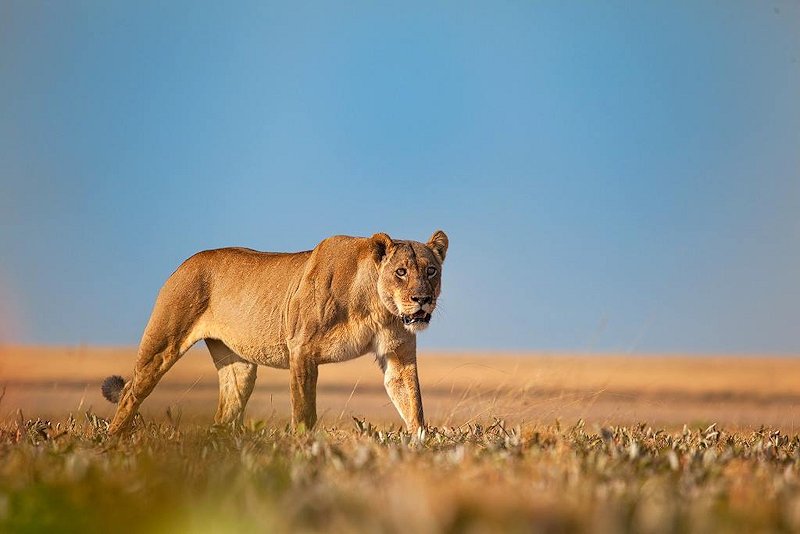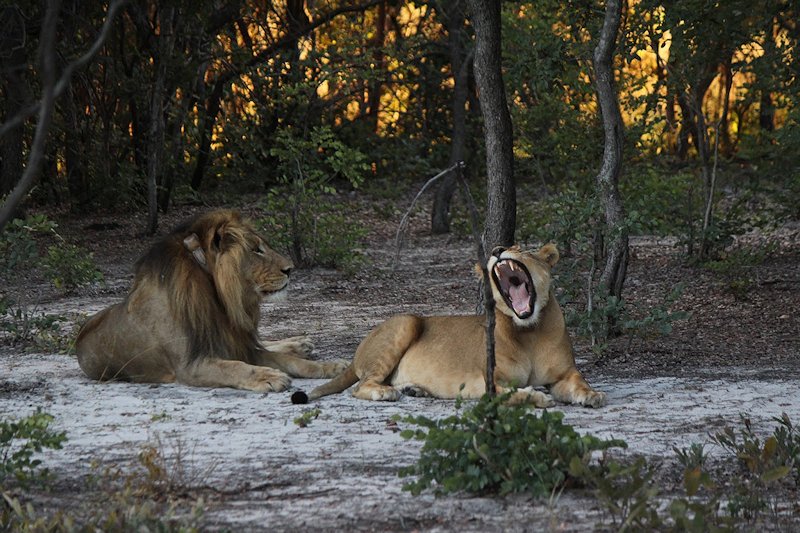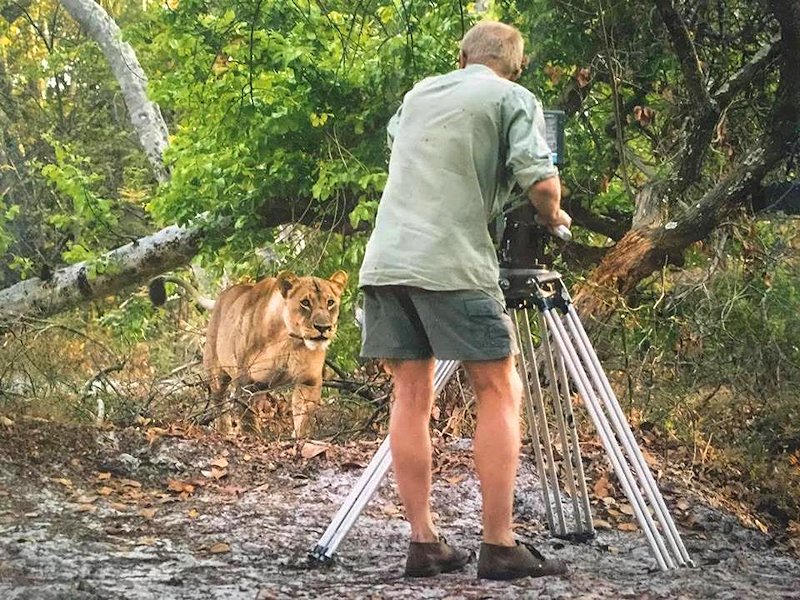Lady Liuwa
The story of the last lioness..
Lady Liuwa
Vast grasslands rich with wildebeest would seem the ideal place for lions to thrive, but when you take away all other lions, add a robust population of hyenas, and mix in a smattering of villages, it suddenly becomes a very dangerous place. Within Liuwa Plain National Park there are few places to hide away for the 20 or so hours that lions sleep every day, and at the first waft of a successful hunt, mobs of hyenas eagerly descend, ready to steal away the hard-earned meal. This was the crushing reality faced every day by Lady Liuwa, the Last Lioness of Liuwa Plain.
For years, she wandered the plains alone, the last bastion of once great prides. The realities of a modern wilderness caught up with Liuwa’s prides, and before anything could be done Lady was alone. In a land without friends and no end of foes, she battled every day for her survival. Lions and hyenas are notorious rivals, regularly throwing down in violent clashes of nerve and claw. Less powerful than lions, hyenas must win the numbers game if they are going to steal away a kill. Without a pride behind her, Lady expended precious energy taking down and defending prey, only to ultimately lose it to hyenas anyway. The real king of the savannah is whoever goes to bed with a full stomach.
The odds weren’t just stacked against her, they were veritably falling on top of her and crushing her to death. But Lady Liuwa was the true queen of the plains and despite the sheer unlikelihood of survival, she did. She learned not just to survive, but to thrive. Most wild lions are lucky to reach 12 years, but Lady achieved an impressive 17 years. A true testament to her spirit.
Every scar on her regal face tells the tale of a life hard earned. Mere brawn was not enough, Lady had to be cunning to survive life on Liuwa Plain. She learned to hang on the periphery of villages, taking advantage of the hyenas’ tendencies to avoid humans. Never entering the settlements nor killing their cattle, she was accepted as a benevolent presence by the villagers. A special bond and deep mutual respect developed between Lady and the villagers. It was widely believed that Lady was the reincarnated spirit of Mambeti, a beloved daughter of the king’s favorite game warden. Every day Lady would rest at Mambeti’s burial site, solidifying her place in the villagers’ hearts. Ultimately, it was this love and appreciation that protected her.
With the ecosystem incomplete, African Parks (AP), the non-profit tasked with managing Liuwa Plain National Park since 2003, decided to reintroduce lions to the park, as a part of their environmental management plan to restore the welfare of the region. After over half a decade of calling into the unanswering abyss, Lady was finally going to get some companionship (and some much-needed back-up).
Lions are social. Generally, they live in prides and rely on family bonds to help protect themselves from the harsh realities of the African bush. Even the solitary males interweave their time alone with a pride or another wandering male. Essentially, lions need each other. Finally, Lady would be reunited with her own kind. When she called out across the plains, a call would at last return. When she lifted her head to the wind, the scent of another lion at last would greet her nose.
In 2009, a year after a failed first attempt, the Zambian Carnivore Program (ZCP) and AP collaborated to transfer two large males from nearby Kafue National Park. It was hoped that one would win the affections of Lady and produce cubs. With time relations were had, but no cubs resulted. Some say Lady was too old, but Innocent Tembo, King Lewanika head guide, believes it wasn’t age.
“She’s the queen of the plains. She wasn’t interested in these boys from the east. They weren’t worthy, so nothing came of it,” he mused over an afternoon coffee break in the bush.
After the stumbling attempt to re-establish a Liuwa pride, AP made the risky decision to introduce females that could mate with the existing males. (They worried young females could harm Lady.) This is how Sepiwa, meaning ‘hope’ in the local dialect, came to live with Lady. Called Sepo for short, she settled into the plains under the watchful guidance of Lady. In a victory for all involved, Sepo lived up to her name, producing a litter of beautiful tumbling, snarling little cubs in 2014. With two new females and a new male, the pride was now up to six. Lady had her family back.
Over the years, a special relationship developed between Lady and Sepo. Now aged 14 or 15, Lady was entering an age that few lions ever see. Still strong but no longer hunting as well as she once did, Lady relied on Sepo to do most of the hunting for the pride. Instead Lady kept her place at the head as the honoured grandmother – guiding the pride with her years of wisdom and babysitting the cubs while Sepo was busy.
“It was sunset and Lady was all alone. We followed her as she slowly rose and began a call and response with Sepo, Lady adjusting her path with each call echoing back from the dark. Eventually we picked up Sepo and the cubs with our spotlight, but Lady still hadn’t noticed them. They were crouched in the long grass, and when Lady was a few metres away, they sprung up, startling Lady who jumped backwards before realizing who it was. She immediately rushed forward, nuzzling Sepo and the cubs who were now jumping on top of her. There was so much love in that moment,” said Andrew, a photographer who spent a month in the national park.
“Once when Lady was recovering from an injury and unable to move with the pride, Sepo hid her cubs away, traveled 40 kms north to Lady, killed a wildebeest and dragged it over to her, all before travelling 40 kms back. That was the kind of love and respect that Lady’s pride had for her. She was a very special lion,” reminisced Innocent about his time with her.
Thanks to the protection and strength of the pride, the cubs are now beautiful adults, roaming the plains just like long ago. Sepo has even welcomed a second litter of cubs – two males who were born this past November. Around the same time another adult male was introduced from Kafue. He had a bit of a rough entry after an explosive encounter with Sepo, but he is slowly familiarising himself with the pride and will be a strong asset to Liuwa’s lions.
Sadly, after 17 years of ruling the plains Lady Liuwa passed away on the 9th of August. It is not known what she died of, but all signs point to natural causes. The last time Innocent saw her in late June she was still strong, but at that age even small things can cause a lion to fade away.
“I was very, very sad to hear that she had passed away. Her story is so touching, and so important to Liuwa Plain. What a special lion…” Innocent said, his downcast eyes hinting at the pain he felt at her passing.
But Lady died not alone, rather surrounded with the love and support of her pride. Though she no longer roams the plains with them, her spirit and her legacy will live forever in Liuwa Plain.
Courtesey: Kelsea Lee from Time + Tide and Innocent Tembo of Norman Carr Safaris.
ARTICLES OF INTEREST
The Tale of a Lioness and a Legacy that Lives on - African Parks 2023
Interview with Lady Liuwa filmmaker Herbert Brauer, Africa Geographic 2016
Go back to: Families & Species Ambassadors
Afterword - 28 SEPTEMBER 2017
It is with heavy hearts that we must once more announce the loss of an important lioness from the Liuwa Pride. Just weeks after the passing of the famous Lady Liuwa, her second in command Sepo has passed as well. In the years following Sepo’s introduction to Liuwa Plain National Park, Lady and Sepo had managed to strike a delicate balance of power between themselves, with Lady contributing wisdom and Sepo contributing brawn. Together they had led the small but recovering Liuwa Pride to stability, giving hope to those working tirelessly to restore lions to the region.
As one of the first females translocated to Liuwa Plain, Sepo was named ‘hope’ in the local Lozi language. She lived up to that name, producing two beautiful litters of cubs – first two females and a male in 2014, and then two males in 2016. A fiercely protective mother, it is believed that Sepo died in a battle with the most recently relocated male when he tried to kill her cubs. This wasn’t the first time they had clashed, having a violent throw down when he first arrived. It may seem barbaric, this is actually normal behaviour for lions. Males want to eliminate the offspring of other males in order to replace them with their own, using their virility to establish themselves as the dominant male in the region.
Unfortunately, in her unending dedication to her cubs Sepo lost her life in a final battle to protect them. But her efforts were not in vein. The most recent news coming out of Liuwa Plain indicates that not only are the two male cubs doing well under the care of their older sisters, but that one of the older sisters now has a cub of her own. So ‘hope’ may be gone, but hope is not lost. The Liuwa Pride will survive this loss, and continue to thrive in their ancestral land.
Read about other species ambassadors..
-
A lion called Christian
The story of a lion born in captivity, purchased from Harrods department store in London, and finally reintroduced into the wild by conservationist George Adamson.
-
Ahmed & Satao
Two illustrious elephant bulls who through their special status drew attention to the plight of these magnificent creatures.
-
Cecil the lion
Killed by a hunter in unfortunate circumstances, Cecil became a symbol of anti-hunting sentiment across the world.
-
Sibella the cheetah
The story of a wild cheetah who defied the odds to become a global ambassador for cheetah conservation.


.jpg)
